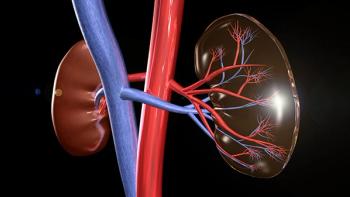
Radiation's role continues to shift in the treatment of patients with prostate cancer.

Radiation's role continues to shift in the treatment of patients with prostate cancer.

Emmanuel S. Antonarakis, MBBCh, an associate professor of oncology at Johns Hopkins Medicine, discussed updated National Comprehensive Cancer Network (NCCN) guidelines for the genetic testing of men with prostate cancer.

While there are some exciting advances coming down the pipeline, there is still much work to do when it comes to the molecular diagnosis of patients with renal cell carcinoma (RCC), explained David I. Quinn, MBBS, PhD, FRACP, FACP.

PD-L1 status may not be the best predictor when it comes to determining who will respond to checkpoint blockade.

Communicating with men about bone health and osteoporosis can pose quite a challenge as this is something many men have often associated with women’s health.

Genetic mutations that were previously associated with breast and ovarian cancer also have implications for men with prostate cancer.


The FDA granted a priority review to pembrolizumab (Keytruda) in combination with axitinib (Inlyta) as a frontline treatment for advanced renal cell carcinoma.

The FDA granted a priority review to avelumab (Bavencio) in combination with axitinib (Inlyta) to treat patients with advanced renal cell carcinoma (RCC).

Adverse events can vary depending on the type of therapy that the patient is on, but patient communication is key.


A recent meta-analysis has found no noticeable difference in immunotherapy's efficacy based on patient sex.

Immunotherapy agents may soon combine with VEGF TKIs to redefine the frontline standard for treatment of metastatic renal cell carcinoma (mRCC).

Neoadjuvant chemotherapy with dose-dense MVAC extends overall survival compared with other chemo regimens in bladder cancer treated with cystectomy.

Patients with renal cell carcinoma (RCC) who were treated with tivozanib (Fotivda) experienced a 26% reduction in the risk of progression or death compared with sorafenib (Nexavar), according to results from the phase 3 TIVO-3 trial.

The FDA has granted the PARP inhibitor rucaparib (Rubraca) a breakthrough therapy designation for single-agent use in adult patients with BRCA1/2-positive metastatic castration-resistant prostate cancer (mCRPC) following at least 1 androgen receptor–directed therapy and taxane-based chemotherapy.

A new test that identifies which bladder cancer tumors will become invasive could help reduce health care costs and over-treatment in patients.

To determine what Americans know—and think they know—about prostate cancer, the PCF surveyed more than 2000 adults in the United States and uncovered some misperceptions that might prevent men who are at risk from accessing screening.

This letter from the Chairman and CEO of Oncology Nursing News gives an overview of the contents of the September 2018 print issue of the magazine.

Combining the PD-L1 inhibitor avelumab (Bavencio) with the VEGF inhibitor axitinib (Inlyta) significantly improved progression-free survival (PFS) compared with sunitinib (Sutent) in treatment-naïve patients with advanced renal cell carcinoma (RCC), according to findings from the phase III JAVELIN Renal 101 study.

A novel glutaminase inhibitor, CB-839, may provide a survival benefit in combination with cabozantinib (Cabometyx) by cutting off the energy supply to tumor cells in patients with metastatic renal cell carcinoma (RCC).

There are still no simple answers to the question of screening for prostate cancer.

African-American and Caucasian patients with metastatic castration-resistant prostate cancer (mCRPC) demonstrated similar overall survival (OS) rates, according to study results presented at the 2018 ASCO Annual Meeting.

Enfortumab vedotin, an antibody-drug conjugate, showed promise as a post-immunotherapy treatment of patients with locally advanced or metastatic urothelial cancer, according to Jonathan E. Rosenberg, MD.

The FDA has approved enzalutamide (Xtandi) for the treatment of patients with nonmetastatic castration-resistant prostate cancer (CRPC).